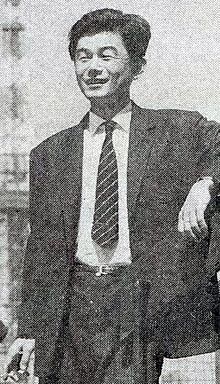Shin'ichi Hoshi
Shinichi Hoshi ( 星新一 , Hoshi Shin'ichi * 6. September 1926 in Tokyo ; † thirtieth December 1997 ibid) was one of the most famous Japanese science fiction - writers .
Life
Shin'ichi Hoshi was born on September 6, 1926 as the son of the Japanese entrepreneur and politician Hajime Hoshi (1873-1951) in Tokyo and grew up with his grandparents. He was supposed to take over the chemical and pharmaceutical factory of his family and therefore took up a science degree at the State University of Tokyo . He earned a master's degree in agricultural chemistry with a thesis on amylase production in 1950 and began writing his doctoral thesis. However, his father died a year later, and Hoshi was forced to abandon his academic career and become the head of the company. This turned out to be completely run down, and after a short time he was forced to give up the company. After the end of his entrepreneurship, Hoshi spent several disoriented years playing the board game Go and going to the cinema. The films shown there and reading Ray Bradbury's narrative cycle The Mars Chronicles gave him the idea to write SF, and he published his first story in a fanzine in 1957 . This story was reprinted by the prestigious Hoseki monthly magazine , more texts followed, and eventually Hoshi became a permanent contributor to the magazine. He also wrote for the then newly founded magazines SF-Magazin and Hitchcock-Magazin and wrote scripts for the SF television series Raumschiff Simca (realized with puppets).
In 1961, his first volume of short short stories was published. These works, often only three to five pages long, were his specialty and made him one of the most famous SF authors in Japan. In his short stories, he used ironic humor to describe the effects of fear of the future and the tragicomic aspects of modern existence; his texts are characterized by bizarre situations, unexpected twists and turns and surprising punchlines. He also wrote two SF novels, thrillers and other screenplays for television , as well as a scientific non-fiction book for young people; usually two to three books were published each year. Together with Sakyō Komatsu and Yasutaka Tsutsui , he is counted among the "Big Three" of Japanese science fiction.
The puppet film The Flower and the Mole , for which he wrote the screenplay, won a prize at the Venice Festival in 1966.
A deceitful planet appeared in Germany in 1982 with 40 of its more than 1,000 short stories.
Shin'ichi Hoshi died on December 30, 1997.
Works (in German translation)
- Shinichi Hoshi: A devious planet . Heyne, Munich 1982, ISBN 3-453-30815-8 .
- Shinichi Hoshi: Crazy Planets. 7 science fiction stories, Schweizerisches Jugendschriften-Werk Zürich, 1985 (selection from A deceitful planet )
literature
- Alpers / Fuchs / Hahn / Jeschke: Lexicon of Science Fiction Literature . Heyne, Munich 1988, ISBN 3-453-02453-2 .
- Michael Morgental : Science Fiction from Another World: Shinichi Hoshi . In: Wolfgang Jeschke (Ed.): Heyne Science Fiction Magazin # 3, Munich 1982, ISBN 3-453-30811-5 , pp. 139-142.
Web links
- Literature by and about Shin'ichi Hoshi in the catalog of the German National Library
- Shinichi Hoshi in the Internet Speculative Fiction Database (English)
- Works by and about Shin'ichi Hoshi at Open Library
- Life and Work The Japanese Literature Home Page Biography
Individual evidence
| personal data | |
|---|---|
| SURNAME | Hoshi, Shin'ichi |
| ALTERNATIVE NAMES | 星, 新 一 (Japanese) |
| BRIEF DESCRIPTION | Japanese science fiction writer |
| DATE OF BIRTH | September 6, 1926 |
| PLACE OF BIRTH | Tokyo |
| DATE OF DEATH | December 30, 1997 |
| Place of death | Tokyo |
